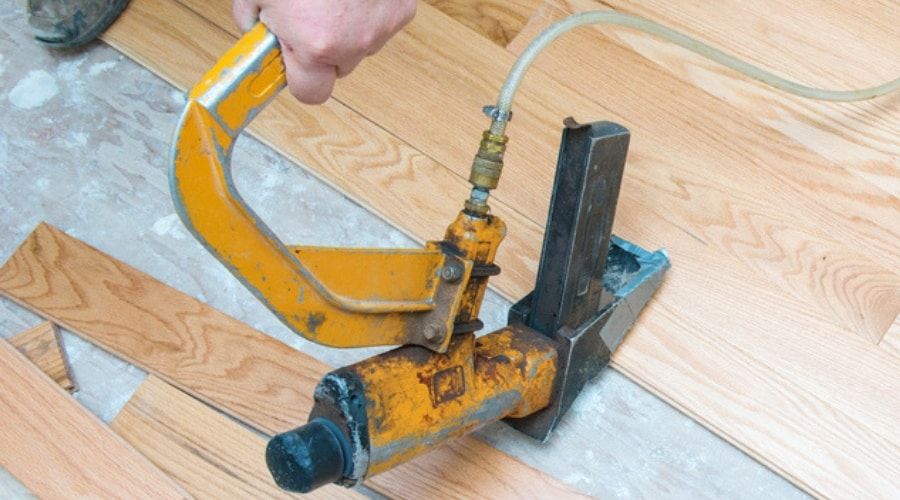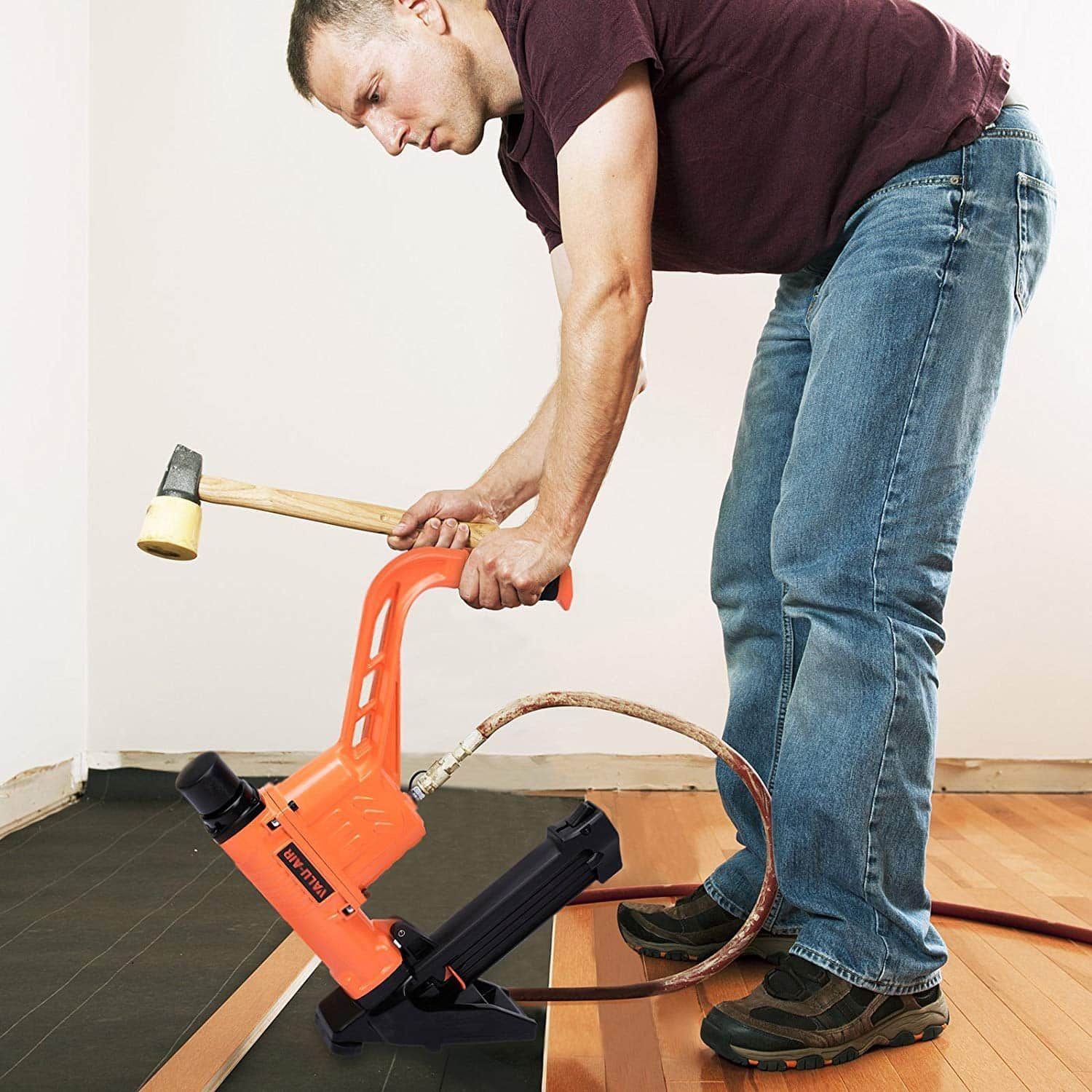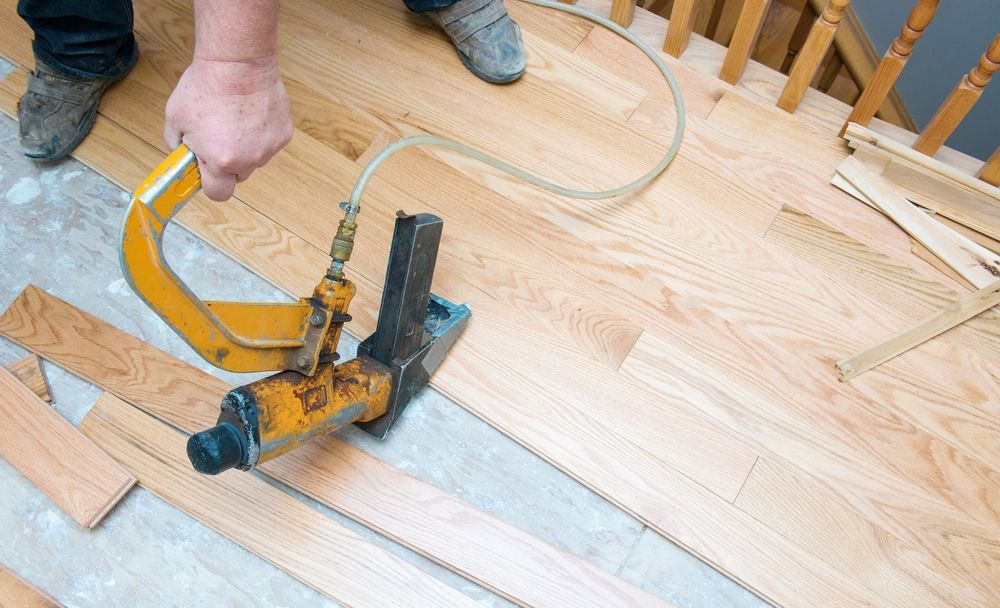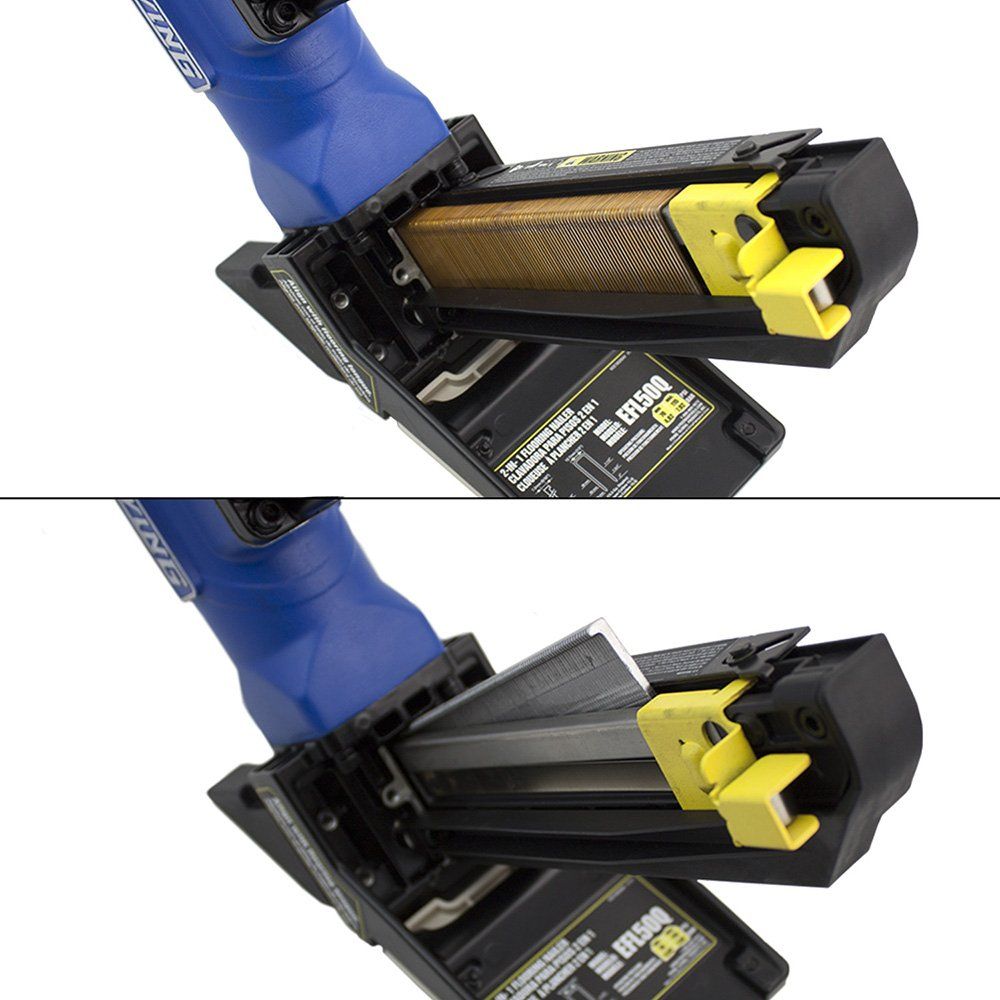Let’s face it, wood flooring is an awesome addition to any home and provides a quality that no carpet can even lend to the decor. Unfortunately, wood flooring can get quite pricey, especially when you have to consider the cost of labor for its installation. But what if you could lay your own?
A DIY wood flooring project is easier than you think, but it does require the proper tools: namely a flooring nailer. This article helps highlight the use of such a tool and reviews some of the best floor nailers available for your consideration.
5 Best Floor Nailer Comparisons
|
IMAGE |
MODEL |
FEATURES |
|
|---|---|---|---|
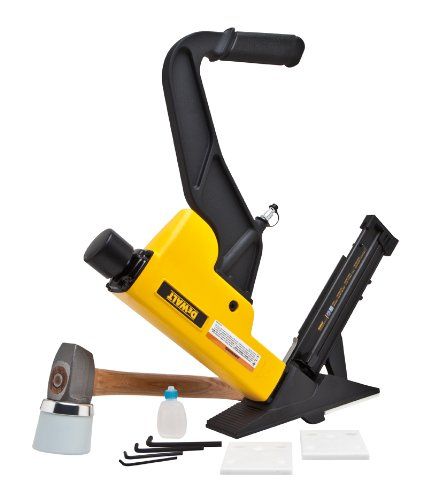
|
DEWALT DWFP12569 2-N-1 Flooring Tool |
|
|
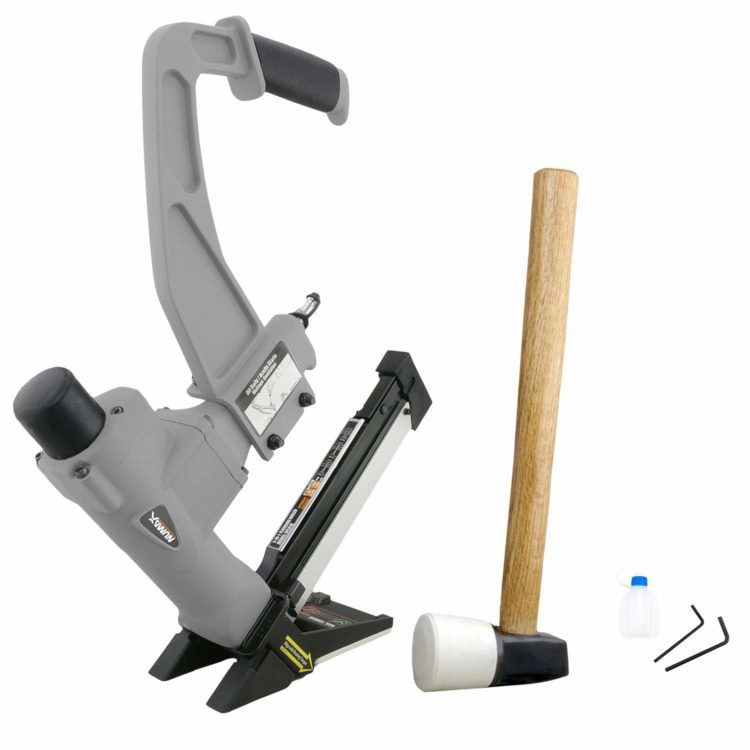
|
NuMax SFL618 3-in-1 Pneumatic Flooring Stapler/Nailer |
|
|
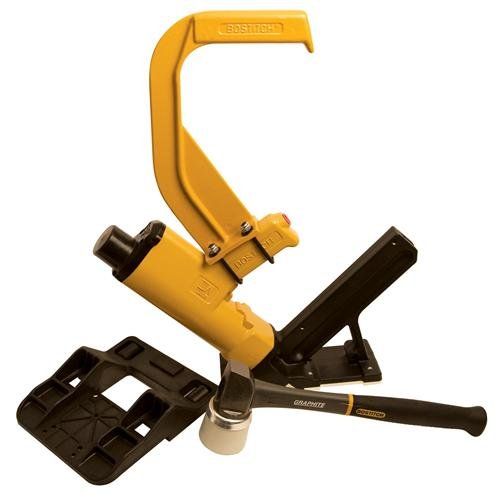
|
BOSTITCH MIIIFN 1-1/2- to 2-Inch Pneumatic Flooring Nailer |
|
|
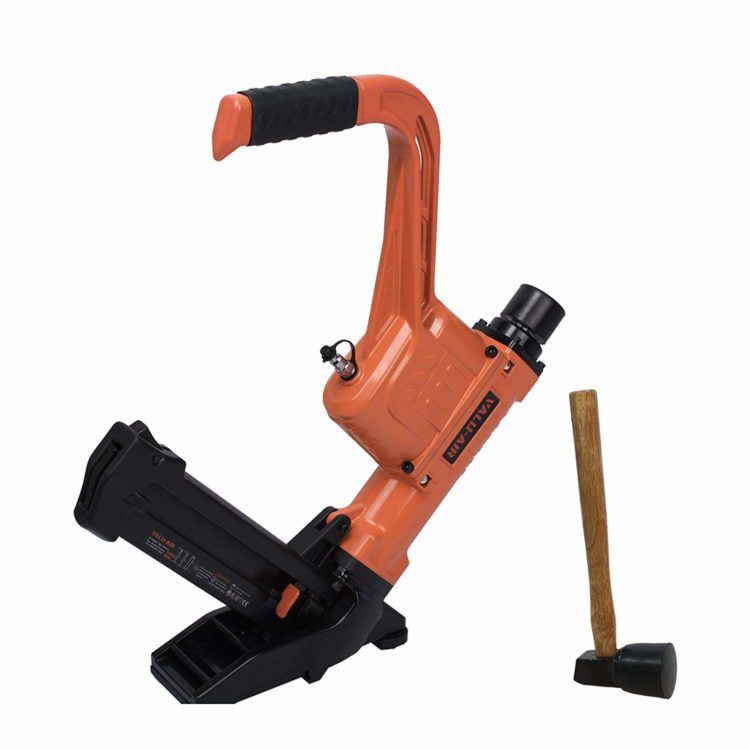
|
Valu-Air 9800ST 3-in-1 Flooring Cleat Nailer and Stapler |
|
|
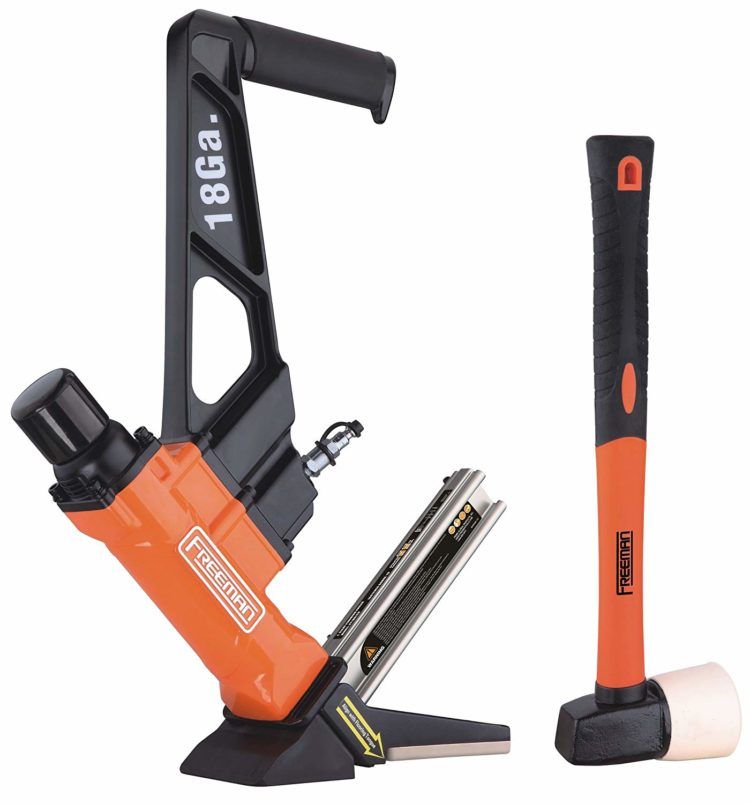
|
Freeman PF18GLCN 18-Gauge Cleat Flooring Nailer for Exotic Flooring |
|
What Do You Use a Flooring Nailer For?
Many types of nail guns have multiple purposes, but a flooring nail is designed specifically with one job in mind: securing a new floor to a stable foundational underlayment. Flooring nailers come in various makes and models and use either staple or cleats for securing materials. These are specialized tools that cannot be used for other nailing jobs, but their investment is well worth considering if you plan on putting down your own flooring.
Why a Flooring Nailer is Better than Other Options
Without a nailer you are faced with one of two options; you can either hire somebody to complete the job for you, which will cost much more than the initial investment of the tool- OR you can hand nail each wooden piece into place. If you are considering the purchase of a flooring nailer then you probably have already ruled out the former, but if you are unsure if the purchase of a new tool is worth it, take into account the following:
- A flooring nailer provides a consistently driven angle from one staple to the next for better adherence.
- Nailers provide consistent power to drive through thick hardwoods to avoid splintering or hammer marks.
- Hand nailing is tedious, time-consuming, and not as accurate.
- Options exist for personal preferences, such as manual, or pneumatic power.
Types of Flooring Nailers
Like most home improvement tools, there are multiple options from which to choose that caters to both various jobs and personal preference. This applies to floor nailers as well. It is important to note that the differences in flooring nails may seem subtle, but are often in reference to what materials you plan on using them with- and so you should keep that in mind when finalizing a purchase.
Power
These tools can be powered multiple ways and care should be taken to understand how they work to provide the power you need for the types of wood you are working with.
- Manual nailers require the use of a rubber mallet that is used against the trigger to fire the staple or cleat. There are powerful tools, but do depend on your own ability to swing the mallet.
- Electric nailers are powered by rechargeable lithium-ion batteries. Although popular for the ease of mobility they provide, you are limited by battery life.
- Pneumatic nailers are by far the most popular and varied due to the consistent power and easy use they offer. You are limited by the air hose and the pressure charge on the required air tank, but air tanks recharge within minutes are there are many portable tanks available for use with nailers.
Fasteners
Flooring nailers use one of two types of fasteners: staples or cleats. Staples are exactly how they sound and are two-pronged, larger metal fasteners that help fast to the material they are used on. They are easy to manufacture and less expensive overall, plus they provide a stronger hold. They can, however, cause splitting of the wood from time to time, so be careful on what you use them on.
There are both L and T style cleats that are named such due to the shape of the heads of the fastener. These are not as durable as staples but are better for use with more delicate and exotic flooring species. They also are commonly used with thin, engineered flooring. Many of the more expensive models can use both staples and cleats.
Questions to Ask Before Purchase
The type of nailer you choose should be dictated by the type of flooring you desire. Choose the tool that is best for the job at hand, and be sure to take into account the thickness of the flooring, as well as the type of wood. Softer wood will not require as much force as hard, more dense wood.
If you are planning on using your nailer for multiple jobs, you want to pick one that can handle regular work. But if you only need the tool for a one time job and are on a budget- there is a tool for that as well.
Your power source is also important to consider. Although not all sources are available for every job, when you have options it is important to take that into account. Choose the best value for you, and take into account the energy you need to provide as well.
Top 5 Flooring Nailer Reviews
These top 5 picks are some of the most popular options for durable nailers. They provide information pertaining to use with various woods and have some of the best reviews compared to similar products.
DEWALT DWFP12569 2-N-1 Flooring Tool
- PSI: 70-100
- Floor Thickness:½-¾ inches
- Cleat or Staple: Both
- Use: Pneumatic Power For all Types of Flooring
- Warranty: 3 years limited
DEWALT is a popular home improvement brand that has proven time and again that it provides quality, durable products that last. This 2 in 1 nailer is a versatile option that can work with both cleats and staples for use against many wood species and thicknesses. Built for professional use, it is a lightweight design that can be easily maneuvered from place to place on a job and has comfortable grips and an extended handle for easy placement.
Pros
- Very versatile and easy to maneuver
- Fires effortlessly and with consistency
- Great for delicate woods
Cons
- Needs regular upkeep to keep o-rings from leaking
- Limited with flooring thickness options
Pro tip
This is a great option for multiple job use that has a professional feel but at a homeowners price range.
NuMax SFL618 3-in-1 Pneumatic Flooring Stapler/Nailer
- PSI: 70-110
- Floor Thickness: ½-¾ inches
- Cleat or Staple: Both
- Use: solid, plus tongue and groove flooring
- Warranty: 1 year limited
This NuMax flooring nailer is a 3 in 1 option that is perfect for solid flooring as well as tongue and groove due to the ability to accommodate 3 different fasteners. With interchangeable baseplates for ½ to ¾ inch flooring, this is a decently versatile choice. A comfort handle grip and the long handle makes carrying it and maneuvering it into place an easy task so you can move quickly through your job.
Pros
- Awesome all around option for homeowners
- Easy fastener loading
- Comes complete with tools
Cons
- No case for the extras
- Requires regular oiling to avoid jams
Pro tip
This is an excellent all-around value tool that comes complete with wrenches and a mallet. If you are looking for a good, versatile choice this is a great option.
BOSTITCH MIIIFN 1-1/2- to 2-Inch Pneumatic Flooring Nailer
- PSI: 70-90
- Floor Thickness: 3/4th inch
- Cleat or Staple: Cleats
- Use: Perfect for engineered flooring
- Warranty: 7 years of limited
Engineered flooring presents its own challenges and is often thinner and more likely to crack when laid. The Bostitch MIIIFN is an awesome solution for these concerns and provides a durable cleat that allows for a powerful, but smooth placement to hold these panels in place. It also can be used with solid wood flooring. The ¾ inch base plate is fairly universal for engineered flooring application, and the high capacity magazine allows you to work quickly and efficiently through the job.
Pros
- Excellent balance and control
- The large magazine can get you through jobs without reloading
- Powerfully constant
Cons
- Limited by baseplate size
Pro tip
This is a quality item by a quality company and is definitely of industrial strength and design. If you need a durable, dependable option for engineered flooring jobs this one won’t let you down.
Valu-Air 9800ST 3-in-1 Flooring Cleat Nailer and Stapler
- PSI: 70-110
- Floor Thickness: ½ - ¾
- Cleat or Staple: both
- Use: All around home use
- Warranty: n/a
The Value-Air 9800ST is a perfect 3 in 1 pick designed for homeowners who need an easy to use, yet powerful value option to lay their own hardwood floors. With the ability to work with both 1 ½ and 2-inch staples, and T and L shaped cleats, there is not much this tool can’t handle. It also can switch between ½ inch and ¾ inch flooring base plates for even more universal use. The lightweight design and long handle make moving it from one place to the next an easy job.
Pros
- Amazing value
- Smooth operation with no jams
- Very lightweight and incredibly easy to reload and use
Cons
- Not industrial strength
- Last nail drops
Pro tip
This is an amazing all around option for easy use and design made with the comfort of the user in mind. If you need a good choice for occasional use and various jobs that is also easy to use, this is it.
Freeman PF18GLCN 18-Gauge Cleat Flooring Nailer for Exotic Flooring
- PSI: 70-115
- Floor Thickness:3/8th -3/4th
- Cleat or Staple: Cleat
- Use: Perfect for exotic flooring options
- Warranty: 7 years limited
The 18 gauge, L-cleats this Freeman Flooring Nailer holds are the perfect option for more delicate, exotic woods that require a powerful, but the smooth drive to avoid breakage and marring. This includes species such as bamboo flooring, teak, cherry, and other options you can check directly with the manufacturer concerning. Interchangeable base plates work well with a large variety of flooring sizes, and the ergonomic design makes it comfortable to work with.
Pros
- Lightweight and easy to use
- Hold a lot of cleats for large workloads
- Very precise and powerful
Cons
- Limited to certain woods
- Height adjustment can be tricky
- Care must be taken to adjust pressure for various species
Pro tip
If you need a dependable choice for exotic woods, this is an excellent option. With such a delicate, and costly wood, you want only the best and this nailer is considered top notch.
Conclusion
When you want to lay your own flooring, these options are some of the best in the business. Everything from power, versatility, and excellent value for the homeowner are reflected in these reviews to provide you a great overview of your choices. Always approach your jobs with both the type of flooring and thickness of the panels in mind to assure yourself of the proper purchase.
If you have any experience with any of these nailers, share with us below! And, as always, let everyone else know about these great picks!

